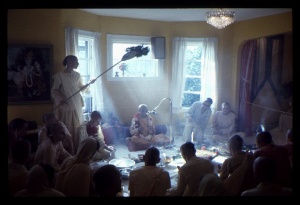SB 5.14.28: Difference between revisions
No edit summary |
(Vanibot #0054 edit - transform synonyms into clickable links, which search similar occurrences) |
||
| Line 23: | Line 23: | ||
<div class="synonyms"> | <div class="synonyms"> | ||
''kvāpi'' | ''[//vanipedia.org/wiki/Special:VaniSearch?s=kvāpi&tab=syno_o&ds=1 kvāpi]'' — somewhere; ''[//vanipedia.org/wiki/Special:VaniSearch?s=deva&tab=syno_o&ds=1 deva]-[//vanipedia.org/wiki/Special:VaniSearch?s=māyayā&tab=syno_o&ds=1 māyayā]'' — by the influence of the illusory energy; ''[//vanipedia.org/wiki/Special:VaniSearch?s=striyā&tab=syno_o&ds=1 striyā]'' — in the form of one's girl friend or wife; ''[//vanipedia.org/wiki/Special:VaniSearch?s=bhuja&tab=syno_o&ds=1 bhuja]-[//vanipedia.org/wiki/Special:VaniSearch?s=latā&tab=syno_o&ds=1 latā]'' — by beautiful arms, which are compared to tender creepers in the forest; ''[//vanipedia.org/wiki/Special:VaniSearch?s=upagūḍhaḥ&tab=syno_o&ds=1 upagūḍhaḥ]'' — being deeply embraced; ''[//vanipedia.org/wiki/Special:VaniSearch?s=praskanna&tab=syno_o&ds=1 praskanna]'' — lost; ''[//vanipedia.org/wiki/Special:VaniSearch?s=viveka&tab=syno_o&ds=1 viveka]'' — all intelligence; ''[//vanipedia.org/wiki/Special:VaniSearch?s=vijñānaḥ&tab=syno_o&ds=1 vijñānaḥ]'' — scientific knowledge; ''[//vanipedia.org/wiki/Special:VaniSearch?s=yat&tab=syno_o&ds=1 yat]-[//vanipedia.org/wiki/Special:VaniSearch?s=vihāra&tab=syno_o&ds=1 vihāra]'' — for the enjoyment of the wife; ''[//vanipedia.org/wiki/Special:VaniSearch?s=gṛha&tab=syno_o&ds=1 gṛha]-[//vanipedia.org/wiki/Special:VaniSearch?s=ārambha&tab=syno_o&ds=1 ārambha]'' — to find a house or apartment; ''[//vanipedia.org/wiki/Special:VaniSearch?s=ākula&tab=syno_o&ds=1 ākula]-[//vanipedia.org/wiki/Special:VaniSearch?s=hṛdayaḥ&tab=syno_o&ds=1 hṛdayaḥ]'' — whose heart becomes engrossed; ''[//vanipedia.org/wiki/Special:VaniSearch?s=tat&tab=syno_o&ds=1 tat]'' — of that house; ''[//vanipedia.org/wiki/Special:VaniSearch?s=āśraya&tab=syno_o&ds=1 āśraya]-[//vanipedia.org/wiki/Special:VaniSearch?s=avasakta&tab=syno_o&ds=1 avasakta]'' — who are under the shelter; ''[//vanipedia.org/wiki/Special:VaniSearch?s=suta&tab=syno_o&ds=1 suta]'' — of sons; ''[//vanipedia.org/wiki/Special:VaniSearch?s=duhitṛ&tab=syno_o&ds=1 duhitṛ]'' — of daughters; ''[//vanipedia.org/wiki/Special:VaniSearch?s=kalatra&tab=syno_o&ds=1 kalatra]'' — of the wife; ''[//vanipedia.org/wiki/Special:VaniSearch?s=bhāṣita&tab=syno_o&ds=1 bhāṣita]-[//vanipedia.org/wiki/Special:VaniSearch?s=avaloka&tab=syno_o&ds=1 avaloka]'' — by the conversations and by their beautiful glances; ''[//vanipedia.org/wiki/Special:VaniSearch?s=viceṣṭita&tab=syno_o&ds=1 viceṣṭita]'' — by activities; ''[//vanipedia.org/wiki/Special:VaniSearch?s=apahṛta&tab=syno_o&ds=1 apahṛta]-[//vanipedia.org/wiki/Special:VaniSearch?s=hṛdayaḥ&tab=syno_o&ds=1 hṛdayaḥ]'' — whose consciousness is taken away; ''[//vanipedia.org/wiki/Special:VaniSearch?s=ātmānam&tab=syno_o&ds=1 ātmānam]'' — himself; ''[//vanipedia.org/wiki/Special:VaniSearch?s=ajita&tab=syno_o&ds=1 ajita]'' — uncontrolled; ''[//vanipedia.org/wiki/Special:VaniSearch?s=ātmā&tab=syno_o&ds=1 ātmā]'' — whose self; ''[//vanipedia.org/wiki/Special:VaniSearch?s=apāre&tab=syno_o&ds=1 apāre]'' — in unlimited; ''[//vanipedia.org/wiki/Special:VaniSearch?s=andhe&tab=syno_o&ds=1 andhe]'' — blind darkness; ''[//vanipedia.org/wiki/Special:VaniSearch?s=tamasi&tab=syno_o&ds=1 tamasi]'' — in hellish life; ''[//vanipedia.org/wiki/Special:VaniSearch?s=prahiṇoti&tab=syno_o&ds=1 prahiṇoti]'' — he hurls. | ||
</div> | </div> | ||
Latest revision as of 22:06, 18 February 2024

A.C. Bhaktivedanta Swami Prabhupada
TEXT 28
- kvāpi deva-māyayā striyā bhuja-latopagūḍhaḥ
- praskanna-viveka-vijñāno yad-vihāra-gṛhārambhākula-hṛdayas
- tad-āśrayāvasakta-suta-duhitṛ-kalatra-bhāṣitāvaloka-viceṣṭitāpahṛta-hṛdaya
- ātmānam ajitātmāpāre 'ndhe tamasi prahiṇoti
SYNONYMS
kvāpi — somewhere; deva-māyayā — by the influence of the illusory energy; striyā — in the form of one's girl friend or wife; bhuja-latā — by beautiful arms, which are compared to tender creepers in the forest; upagūḍhaḥ — being deeply embraced; praskanna — lost; viveka — all intelligence; vijñānaḥ — scientific knowledge; yat-vihāra — for the enjoyment of the wife; gṛha-ārambha — to find a house or apartment; ākula-hṛdayaḥ — whose heart becomes engrossed; tat — of that house; āśraya-avasakta — who are under the shelter; suta — of sons; duhitṛ — of daughters; kalatra — of the wife; bhāṣita-avaloka — by the conversations and by their beautiful glances; viceṣṭita — by activities; apahṛta-hṛdayaḥ — whose consciousness is taken away; ātmānam — himself; ajita — uncontrolled; ātmā — whose self; apāre — in unlimited; andhe — blind darkness; tamasi — in hellish life; prahiṇoti — he hurls.
TRANSLATION
Sometimes the conditioned soul is attracted by illusion personified (his wife or girl friend) and becomes eager to be embraced by a woman. Thus he loses his intelligence as well as knowledge of life's goal. At that time, no longer attempting spiritual cultivation, he becomes overly attached to his wife or girl friend and tries to provide her with a suitable apartment. Again, he becomes very busy under the shelter of that home and is captivated by the talks, glances and activities of his wife and children. In this way he loses his Kṛṣṇa consciousness and throws himself in the dense darkness of material existence.
PURPORT
When the conditioned soul is embraced by his beloved wife, he forgets everything about Kṛṣṇa consciousness. The more he becomes attached to his wife, the more he becomes implicated in family life. One Bengali poet, Bankim Chandra, says that to the eyes of the lover the beloved is always very beautiful, even though ugly. This attraction is called deva-māyā. The attraction between man and woman is the cause of bondage for both. Actually both belong to the parā prakṛti, the superior energy of the Lord, but both are actually prakṛti (female). However, because both want to enjoy one another, they are sometimes described as puruṣa (male). Actually neither is puruṣa, but both can be superficially described as puruṣa. As soon as man and woman are united, they become attached to home, hearth, land, friendship and money. In this way they are both entrapped in material existence. The word bhuja-latā-upagūḍha, meaning "being embraced by beautiful arms which are compared to creepers," describes the way the conditioned soul is bound within this material world. The products of sex life—sons and daughters—certainly follow. This is the way of material existence.